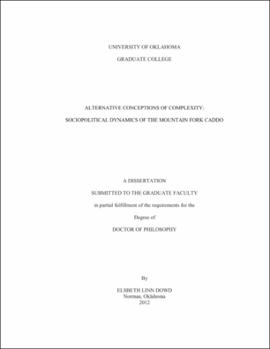| dc.contributor.advisor | Livingood, Patrick C | |
| dc.creator | Dowd, Elsbeth Linn | |
| dc.date.accessioned | 2019-04-27T21:28:13Z | |
| dc.date.available | 2019-04-27T21:28:13Z | |
| dc.date.issued | 2012 | |
| dc.identifier | 99217616202042 | |
| dc.identifier.uri | https://hdl.handle.net/11244/318765 | |
| dc.description.abstract | The Mountain Fork Caddo lived along the Mountain Fork River in southeastern Oklahoma between approximately A.D. 1000 and 1600. These dispersed, sedentary communities shared much in common with other southeastern peoples, including maize production and the construction of earthen mounds. Unlike some southeastern societies, though, little evidence for status differentiation or a strongly hierarchical sociopolitical structure is present among the Mountain Fork society. This dissertation develops an alternative model for understanding the sociopolitical dynamics of the Mountain Fork Caddo by conducting a detailed analysis of site chronology, social identity, and leadership in ritual contexts. It uses a data set drawn from the six significant excavations in this valley at the Ramos Creek, Woods Mound Group, Hughes, E. Johnson, Beaver, and Biggham Creek sites, focusing primarily on three main forms of evidence: pottery, radiocarbon dates, and paleobotanical samples. | |
| dc.description.abstract | The two mound sites, Woods and Biggham Creek, represent significant ceremonial places that are excellent venues for studying the intersection of social practice, political leadership, and ritual practice. This dissertation shows that these sites were occupied sequentially and that they were characterized by distinctly different social practices, interpreted as demonstrating a shift towards more specialization and centralization of leadership roles in the fifteenth century. Concurrently, the Mountain Fork communities shifted towards the south, abandoning sites in the northern part of the drainage and developing more ties with communities along the Little and Red Rivers. This dissertation argues that the development of particular archaeological histories is critical for understanding variation in small-scale societies and how those societies articulated with the broader world. | |
| dc.format.extent | 368 pages | |
| dc.format.medium | application.pdf | |
| dc.language | en_US | |
| dc.relation.requires | Adobe Acrobat Reader | |
| dc.subject | McCurtain County (Okla.)--Antiquities | |
| dc.subject | Caddoan Indians--Oklahoma--McCurtain County | |
| dc.subject | Excavations (Archaeology)--Oklahoma--McCurtain County | |
| dc.subject | Caddoan Indians--Social conditions | |
| dc.title | Alternative Conceptions of Complexity: Sociopolitical Dynamics of the Mountain Fork Caddo | |
| dc.type | text | |
| dc.type | document | |
| dc.thesis.degree | Ph.D. | |
| ou.group | College of Arts and Sciences::Department of Anthropology | |
